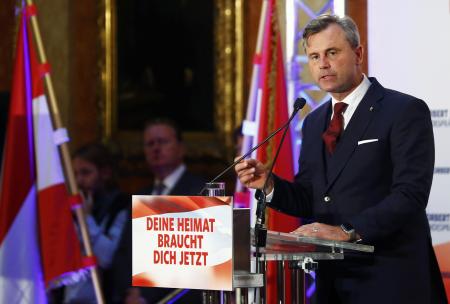
By Francois Murphy and Shadia Nasralla
VIENNA (Reuters) – Norbert Hofer, vying to become the first freely elected far-right head of state in Europe since World War Two, said on Friday that opponents who repeatedly accused him of seeking a break with the European Union were themselves damaging Austria.
Hofer had initially said Austria could follow Britain’s vote to leave the EU with one of its own within a year. Although he quickly backed away from that suggestion, his opponent Alexander Van der Bellen has cited it as proof Hofer is in favour of “Oexit”, an Austrian version of Brexit.
The neck-and-neck presidential election between the two men on Sunday will be a new measure of the wave of populism sweeping through Europe and the United States. It is a re-run of a vote held on May 22, before Britain voted to leave the EU and Americans elected Donald Trump as president.
The issue was one of several the two men clashed over in an unexpectedly ill-tempered debate on Thursday night, accusing each other of lying and unfair tactics.
“People who permanently talk about Oexit and accuse others of damaging the country with talk of Oexit should take a look at themselves and think about whether they are the ones damaging Austria the most,” Hofer told a campaign meeting.
Speaking beneath a backdrop bearing the slogan “Your homeland needs you now”, Hofer added that the EU was in crisis and he did not want to cede more power to Brussels.
“I do not want to be the governor of Austria,” he said, without explicitly ruling out a referendum on the EU.
Hofer narrowly lost the vote in May to Van der Bellen, a former leader of the Greens, but it has been rerun because of irregularities in the counting of postal ballots. Opinion polls since have regularly shown the race is too close to call.
In Thursday’s clash, Van der Bellen produced a picture of his dead father to denounce an accusation by a senior figure in Hofer’s Freedom Party that his father was a Nazi. The two traded interjections such as “That is a lie”.
The tone was a particularly striking shift for Hofer, whose easy smile and smooth delivery had earned him a reputation as the friendly face of a party railing against immigration and Islam.
In a speech touching on themes such as lowering taxes and improving trade relations, especially with Russia, Hofer also said immigrants such as refugees should not be able to claim the same benefits as Austrians.
Van der Bellen, walking in front of an Oompah band to mark the end of his campaign, made his way through a crowd of supporters in Vienna’s Favoriten district, which is known all over Austria for its migrant population.
“This is about which direction our homeland, Austria, is supposed to take,” he said, calling on voters to allow him to be a “president of the middle”.
“Do we want Austria to remain an important member in this Europe?” he asked a crowd who replied with shouts of “Yes!”
In May, the 760,000 postal ballots swung the election in Van der Bellen’s favour, giving him a margin of victory of just 31,000 votes, or 0.7 percentage points.
In Austria, special ballots used for postal voting can also be cast in polling stations, making the number of postal ballots hard to predict. The Interior Ministry said on Friday that 20 percent fewer of those special ballots had been issued for this election than in May, a total of 708,185.
That was roughly in line with expectations, which were mainly based on the fact more voters were likely to be away from home on the election weekend in the spring.
(Writing by Francois Murphy; Editing by Mark Trevelyan)
